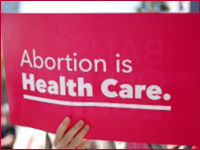 In a recent Liberty Itch article on abortion, the clinching argument was that being pro-choice regarding the Covid vaccine made the pro-life position on abortion hypocritical. I disagree.
In a recent Liberty Itch article on abortion, the clinching argument was that being pro-choice regarding the Covid vaccine made the pro-life position on abortion hypocritical. I disagree.
Although prioritising individual liberty, libertarians also recognise that there is a role for government in protecting individual rights and property. Abortion, which has impacts on the mother, father and unborn child, therefore falls well within the ambit of libertarian discussion.
The matter of vaccination is a largely personal one – doubly so when the vaccine has not undergone normal medical trials to establish safety and efficacy.
Governments chose to indemnify drug companies from any negative outcomes as a result of the use of their Covid vaccines, a move that was as irresponsible as it was outrageous. These decisions further strengthen the argument for personal choice and autonomy.
On the matter of abortion, women indeed have a choice. They can choose to abstain from sex, thus avoiding any pregnancy. Alternatively, they can use contraceptive measures to significantly reduce the likelihood of pregnancy. The argument that a woman’s right to kill her unborn child is ‘empowering’ equates to the use of abortion as a convenient post-conception contraceptive.
The utilitarian argument, using abortion to reduce poverty and suffering, is also unconvincing – summarised neatly in the statement that a woman “should have the right to remove it, just as someone has the right to remove a guest from their property”.
As any property owner knows, removing a squatter or tenant who refuses to pay rent is far from simple, as the law is at pains to protect those who may be vulnerable. Further, any owner who evicted a squatter, tenant or guest while knowing that eviction would lead to their immediate death would surely risk being charged with manslaughter, if not murder.
If the utilitarian position is a reasonable one, then throwing an unwanted pet out of a car in a snowstorm is also perfectly acceptable.
Unsurprisingly, and very fortunately, making anything a crime does attract government coercion. I may not agree with the law, but I do expect the government to enforce any law it passes. On the other hand, as we know all too well, banning something does not mean it does not occur.
The argument that “It is wrong to violate the bodily autonomy of one person to keep another alive” acknowledges that the unborn child is a person. The pro-choice position then seeks to justify the unborn child’s murder on the basis that it violated the ‘individual rights’ of the mother, whose rights outrank the unborn child’s life.
If we are to accept that the ‘rights’ of one individual trump the ‘rights’ or, more importantly, the life of another, then this suggests that a hierarchy of individuals can be established for all individuals in our society. It also means an unborn foetus has the same right to life as the woman in which it is located.
By the same logic, should we kill recidivists to supply life-saving organs to more worthy persons?
Pregnant women can, of course, avoid the impact and responsibility of raising a child by placing the baby up for adoption.
The pro-choice argument for bodily autonomy once the woman has become pregnant also doesn’t hold water.
Imagine a pilot who decides halfway through a flight that they no longer wish to be a pilot, or a surgeon who decides halfway through surgery that they no longer wish to operate.
As a society, we expect people charged with responsibilities to discharge those responsibilities with all due care. A pilot or surgeon is at liberty not to commence a flight or operation, and to cease performing those functions when it is safe to do so. In a similar vein, a pregnant woman is responsible for the safe care of her unborn child and should be obliged to fulfil those responsibilities until that child can be safely delivered to the care of others.
We can all agree that men and women should be able to choose whether or not to have a child, or whether or not to keep a child after birth. What I cannot agree with is ending a child’s life simply because it is convenient for the mother and/or father. Even if the child is conceived as a result of rape or incest, or due to contraceptive failure, convenience is not a sufficient reason.
In South Australia last year, a bill was introduced into the parliament requiring that women who choose to terminate a pregnancy after 28 weeks induce the child alive, not stillborn. After 28 weeks, with proper care, babies are viable outside the womb.
The bill did not prevent women from terminating their pregnancies, it only insisted that the baby be born alive, not euthanized and be born dead.
Presumably, as the woman was planning to abort the child, giving the child to a loving couple to adopt would not be opposed. This would have given rise to a significant number of new adoptions.
The bill was defeated 10 votes to 9 in South Australia’s Upper House.
As a woman’s ‘right to choose’ a termination was not being compromised, why anyone would oppose saving the life of the child when it was going to be aborted anyway is beyond me.
Our laws are distinctly uneven when it comes to the issue of abortion.
On the one hand, they allow mothers to decide the fate of the child without the father’s input. On the other, if the mother decides to continue with the pregnancy, despite the father wanting an abortion, then the father remains responsible for the provision of child support.
In this regard, the silence from pro-choice feminists is deafening.
Personally, I would argue that the entire pro-choice abortion argument is a hypocritical house of cards.
For example, in 2009, a bill called ‘Zoe’s Law’ was introduced into the NSW Parliament that aimed to recognize the death of an unborn child as a separate offence – particularly in cases where the loss of the foetus was caused by a criminal act against the mother.
Named after Zoe Donegan, an unborn child who died in 2009 after her mother, Brodie Donegan, was injured in a car accident caused by a reckless driver, the case sparked debate about whether the legal system adequately addressed the loss of an unborn child in such circumstances.
The bill was eventually watered down and became the ‘Crimes Legislation Amendment (Loss of Foetus) Act 2021’ and is now the operative law in New South Wales for addressing the loss of an unborn child due to criminal acts.
Finally, our society prosecutes people for damaging the eggs of endangered eagles or nesting sites while celebrating human abortions, all while human birth rates continue to fall below replacement rates.
Thank you for your support.
 Heinrich Heine’s ominous line, “Those who burn books will in the end burn people,” is one of the most quoted in modern history. It appears in his 1821 play, Almansor.
Heinrich Heine’s ominous line, “Those who burn books will in the end burn people,” is one of the most quoted in modern history. It appears in his 1821 play, Almansor.